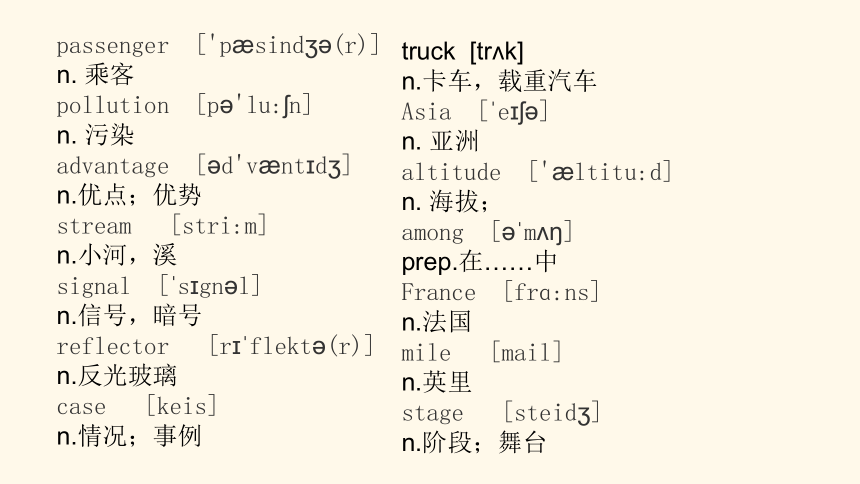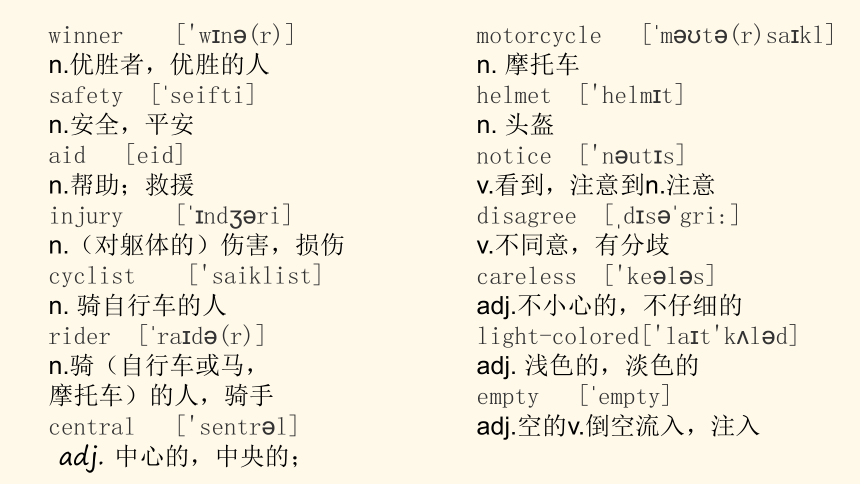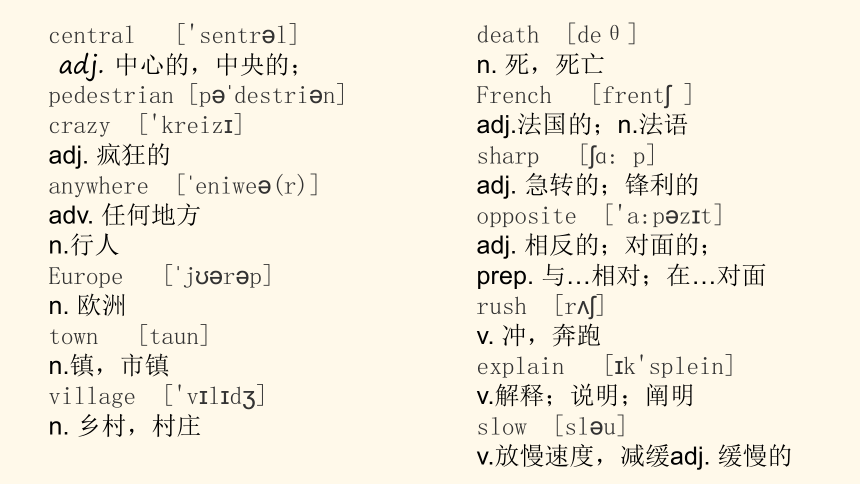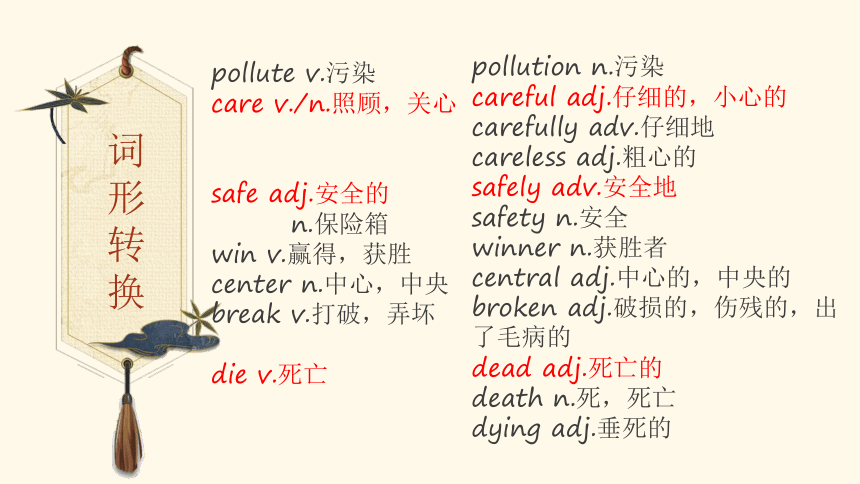Unit 6 Enjoying Cycling Topic 3 Bicycle riding is good exercise. 基础巩固与复习 课件(共23张PPT,无音频,WPS打开)
文档属性
| 名称 | Unit 6 Enjoying Cycling Topic 3 Bicycle riding is good exercise. 基础巩固与复习 课件(共23张PPT,无音频,WPS打开) |  | |
| 格式 | zip | ||
| 文件大小 | 5.0MB | ||
| 资源类型 | 教案 | ||
| 版本资源 | 仁爱科普版 | ||
| 科目 | 英语 | ||
| 更新时间 | 2020-05-28 14:13:29 | ||
图片预览









文档简介
(共23张PPT)
话题巩固复习
Unit
6
Enjoying
Cycling
Topic
1
We're
going
on
a
three-day
visit
to
Mount
Tai.
【目
录】
壹
叁
贰
肆
词组巩固
词性转换
单词发音巩固
句型巩固
伍
语法部分
壹
单词发音巩固
passenger
['p?sind??(r)]
n.
乘客
pollution
[p?'lu:?n]
n.
污染
advantage
[?d'v?nt?d?]
n.优点;优势
stream
[stri:m]
n.小河,溪
signal
[?s?gn?l]
n.信号,暗号
reflector
[r??flekt?(r)]
n.反光玻璃
case
[keis]
n.情况;事例
truck
[tr?k]
n.卡车,载重汽车
Asia
[?e???]
n.
亚洲
altitude
['?ltitu:d]
n.
海拔;
among
[??m??]
prep.在……中
France
[frɑ:ns]
n.法国
mile
[mail]
n.英里
stage
[steid?]
n.阶段;舞台
motorcycle
[?m??t?(r)sa?kl]
n.
摩托车
helmet
['helm?t]
n.
头盔
notice
['n?ut?s]
v.看到,注意到n.注意
disagree
[?d?s??gri:]
v.不同意,有分歧
careless
['ke?l?s]
adj.不小心的,不仔细的
light-colored['la?t'k?l?d]
adj.
浅色的,淡色的
empty
[?empty]
adj.空的v.倒空流入,注入
winner
['w?n?(r)]
n.优胜者,优胜的人
safety
[?seifti]
n.安全,平安
aid
[eid]
n.帮助;救援
injury
[??nd??ri]
n.(对躯体的)伤害,损伤
cyclist
['saiklist]
n.
骑自行车的人
rider
[?ra?d?(r)]
n.骑(自行车或马,
摩托车)的人,骑手
central
['sentr?l]
adj.
中心的,中央的;
death
[deθ]
n.
死,死亡
French
[frent?
]
adj.法国的;n.法语
sharp
[?ɑ:
p]
adj.
急转的;锋利的
opposite
['a:p?z?t]
adj.
相反的;对面的;
prep.
与…相对;在…对面
rush
[r??]
v.
冲,奔跑
explain
[?k'splein]
v.解释;说明;阐明
slow
[sl?u]
v.放慢速度,减缓adj.
缓慢的
central
['sentr?l]
adj.
中心的,中央的;
pedestrian
[p??destri?n]
crazy
['kreiz?]
adj.
疯狂的
anywhere
[?eniwe?(r)]
adv.
任何地方
n.行人
Europe
[?j??r?p]
n.
欧洲
town
[taun]
n.镇,市镇
village
['v?l?d?]
n.
乡村,村庄
贰
词性转换
pollution
n.污染
careful
adj.仔细的,小心的
carefully
adv.仔细地
careless
adj.粗心的
safely
adv.安全地
safety
n.安全
winner
n.获胜者
central
adj.中心的,中央的
broken
adj.破损的,伤残的,出了毛病的
dead
adj.死亡的
death
n.死,死亡
dying
adj.垂死的
?
词
形
转
换
pollute
v.污染
care
v./n.照顾,关心
safe
adj.安全的
????????n.保险箱
win
v.赢得,获胜
center
n.中心,中央
break
v.打破,弄坏
die
v.死亡
叁
词组巩固
发生一场交通事故
受伤
热衷于……
处于危险之中
遵守交通规则
违反交通规则
减速
空气污染
得到一个罚单
阻止
拐错弯
在左手边
have
a
traffic
accident
be/get
hurt
be
crazy
about
be
in
danger
obey
the
traffic
rules
break
the
traffic
rules
slow
down
air
pollution
get
a
fine
keep
from
doing
sth
make
a
wrong
turn
on
the
left-hand
side
of...
注意做某事
交通信号
仅仅只为乐趣
如果,假使
急救
简而言之,一句话,总之
不同意某人,持不同意见
小心,当心
把……倒入……
注意某人正在做某事
注意某人经常做某事
pay
attention
to
doing
sth.
=care
for
doing
sth
traffic
signals
just
for
fun
in
case
of
first
aid
in
a
word/in
short
disagree
with
sb.
look
out/be
careful
empty…into…
notice
sb.
doing
sth.
notice
sb.
do
sth.
肆
句型巩固
句
型
1.
I
agree
with
you.
我同意您得瞧法。
agree
with
同意某人(得瞧法/
意见),
主语通常就是事物而不就是人。
agree
to
表示“同意,
赞成”,
后面跟得就是表示想法,
建议或计划等得词。
e.
g.
:
I
agree
with
what
he
said.
我同意她讲得话。
He
didn’
t
agree
to
our
idea.
她不同意我们得想法。
2.If
you
break
the
traffic
rules,
you
will
get
a
fine.
如果您违反交通规则,
您就会受到处罚。
fine
既可当名词,
也可当动词。
He
got
a
?50
fine
for
parking
the
wrong
places.
她因乱停车罚款五十元。(名词)
The
policeman
fined
him
50
yuan.
警察罚了她五十元。(动词)
3.Don’
t
forget
to
pay
attention
to
the
rules.
别忘了注意交通规则。
pay
attention
to
(doing)
sth
注意做某事
We
must
pay
attention
to
obeying
the
rules.
我们必须注意遵守交通规则。
1.______________________________________________
______________________________________________
如果人们遵守交通规则,将会有更少的交通事故。
2.______________________________________________
______________________________________________
骑自行车能帮我们节约能源并且不会导致空气污染。
3.______________________________________________
停放自行车也是容易的。
4.______________________________________________
自行车比小汽车需要的空间更少。
。
If
people
obey
the
traffic
rules,
there
will
be
fewer
accidents.
Cycling
can
help
us
save
energy
and
it
doesn’t
cause
air
pollution.
It’s
easy
to
park
bikes.
Bicycles
need
less
space
than
cars.
句
型
5.______________________________________________
当骑自行车的时候我们应该戴上自行车头盔。
6.______________________________________________
______________________________________________
如果我们违反交通规则,我们可能受到处罚甚至处于危险中。
7.______________________________________________
______________________________________________
如果我们在晚上骑车我们应该有灯在自行车上或者穿浅色的衣服。
8.______________________________________________
______________________________________________
总之,安全最好的方式是要小心
We
should
wear
bicycle
helmets
when
riding.
If
we
break
the
traffic
rules,
we
may
get
a
fine
and
even
be
in
danger.
If
we
ride
at
night,
we
should
have
lights
on
the
bicycle
or
wear
light-colored
clothes.
In
a
word,
the
best
way
to
be
safe
is
to
be
careful.
伍
语法部分
一、
if
条件句的构成及位置
在
if
引导的条件状语从句中,
if
条件句位置灵活。
从句可以位于主句前,
也可位于主句之后。
从
句在前时,
主从句之间必须有逗号隔开。
如:
If
you
want
to
make
a
good
score,
please
study
hard.
如果想得到好分数,
请努力学习。
二、
if
条件句的时态
应遵循主、
从句时态呼应的原则。
主句是一般时(
包括祈使句和含有情态动词等句子)
,
从
句要用一般现在时。
如:
If
you
want
to
go
skating,
wear
warm
clothes.
如果你想去滑冰,
穿暖和衣服。
Work
hard
if
you
know
you
don’t
study
well.
如果你知道你没有学好,
努力吧。
条
件
状
语
从
句
三、
使用
if
条件句的注意事项
1)
在
if
条件句中,
当主句是一般将来时时,
不能用
be
going
to
结构,
而要用
will
来代替。
如:
I’ll
help
you
with
your
swimming
if
I
have
time
tomorrow.
如果我明天有空,
我会帮忙你学游泳。
时态:
主句就是一般将来时态或具有将来的含义,
从句常用一般现在时。
If
you
break
the
traffic
rules,
you
will
get
a
fine.
If
it
rains
tomorrow,
we
won’t
hold
the
sports
meeting.
If
you
drive
a
car
in
Britain,
you
must
be
careful.
2)
在
if
条件句中不能用
some,
而要用
any
来代替。
如:
If
you
have
any
questions
to
ask,
please
come
to
my
office.
如果你有问题要问的话,
请到我的办公室来。
拓展:
if
引
导的条件从句可以转化成简单句:
条件状语从句:
由
if
引导,表
“如果”。
3)祈使句,与and/or简单句的互相转换。
“祈使句
+
and
+
陈述句”
,
常转换成肯定条件句;
Hurry
up,
and
you
will
catch
the
bus.
=
If
you
hurry
up,
you
will
catch
the
bus.
“祈使句
+
or
+
陈述句”
,
常转换成否定条件句。
Hurry
up,
or
you
won’t
catch
the
bus.
=
If
you
don’t
hurry,
you
won’t
catch
the
bus.
Be
careful,
or
a
car
may
h.t
you.
=
If
you
aren’t
careful,
a
car
may
hit
you.
条件句转换成简单句。
如果两句间的关系为“承接”,
用
and;
If
you
go
along
this
road,
find
the
hospital.
=Go
along
this
road,
and
you
will
find
the
hospital.
沿着这条路走,
你就会找到那家医院。
若为“转折”就要用
or
来代替。
如:
If
you
study
hard,
catch
up
with
others.
=
Study
hard
and
you
will
catch
up
with
others.
努力学习你就会赶上其他人。
If
you
don’t
hurry
up,
be
late.
=
Hurry
up,
or
you
will
be
late.
赶快,
否则你会迟到的。
Thank
you
!
话题巩固复习
Unit
6
Enjoying
Cycling
Topic
1
We're
going
on
a
three-day
visit
to
Mount
Tai.
【目
录】
壹
叁
贰
肆
词组巩固
词性转换
单词发音巩固
句型巩固
伍
语法部分
壹
单词发音巩固
passenger
['p?sind??(r)]
n.
乘客
pollution
[p?'lu:?n]
n.
污染
advantage
[?d'v?nt?d?]
n.优点;优势
stream
[stri:m]
n.小河,溪
signal
[?s?gn?l]
n.信号,暗号
reflector
[r??flekt?(r)]
n.反光玻璃
case
[keis]
n.情况;事例
truck
[tr?k]
n.卡车,载重汽车
Asia
[?e???]
n.
亚洲
altitude
['?ltitu:d]
n.
海拔;
among
[??m??]
prep.在……中
France
[frɑ:ns]
n.法国
mile
[mail]
n.英里
stage
[steid?]
n.阶段;舞台
motorcycle
[?m??t?(r)sa?kl]
n.
摩托车
helmet
['helm?t]
n.
头盔
notice
['n?ut?s]
v.看到,注意到n.注意
disagree
[?d?s??gri:]
v.不同意,有分歧
careless
['ke?l?s]
adj.不小心的,不仔细的
light-colored['la?t'k?l?d]
adj.
浅色的,淡色的
empty
[?empty]
adj.空的v.倒空流入,注入
winner
['w?n?(r)]
n.优胜者,优胜的人
safety
[?seifti]
n.安全,平安
aid
[eid]
n.帮助;救援
injury
[??nd??ri]
n.(对躯体的)伤害,损伤
cyclist
['saiklist]
n.
骑自行车的人
rider
[?ra?d?(r)]
n.骑(自行车或马,
摩托车)的人,骑手
central
['sentr?l]
adj.
中心的,中央的;
death
[deθ]
n.
死,死亡
French
[frent?
]
adj.法国的;n.法语
sharp
[?ɑ:
p]
adj.
急转的;锋利的
opposite
['a:p?z?t]
adj.
相反的;对面的;
prep.
与…相对;在…对面
rush
[r??]
v.
冲,奔跑
explain
[?k'splein]
v.解释;说明;阐明
slow
[sl?u]
v.放慢速度,减缓adj.
缓慢的
central
['sentr?l]
adj.
中心的,中央的;
pedestrian
[p??destri?n]
crazy
['kreiz?]
adj.
疯狂的
anywhere
[?eniwe?(r)]
adv.
任何地方
n.行人
Europe
[?j??r?p]
n.
欧洲
town
[taun]
n.镇,市镇
village
['v?l?d?]
n.
乡村,村庄
贰
词性转换
pollution
n.污染
careful
adj.仔细的,小心的
carefully
adv.仔细地
careless
adj.粗心的
safely
adv.安全地
safety
n.安全
winner
n.获胜者
central
adj.中心的,中央的
broken
adj.破损的,伤残的,出了毛病的
dead
adj.死亡的
death
n.死,死亡
dying
adj.垂死的
?
词
形
转
换
pollute
v.污染
care
v./n.照顾,关心
safe
adj.安全的
????????n.保险箱
win
v.赢得,获胜
center
n.中心,中央
break
v.打破,弄坏
die
v.死亡
叁
词组巩固
发生一场交通事故
受伤
热衷于……
处于危险之中
遵守交通规则
违反交通规则
减速
空气污染
得到一个罚单
阻止
拐错弯
在左手边
have
a
traffic
accident
be/get
hurt
be
crazy
about
be
in
danger
obey
the
traffic
rules
break
the
traffic
rules
slow
down
air
pollution
get
a
fine
keep
from
doing
sth
make
a
wrong
turn
on
the
left-hand
side
of...
注意做某事
交通信号
仅仅只为乐趣
如果,假使
急救
简而言之,一句话,总之
不同意某人,持不同意见
小心,当心
把……倒入……
注意某人正在做某事
注意某人经常做某事
pay
attention
to
doing
sth.
=care
for
doing
sth
traffic
signals
just
for
fun
in
case
of
first
aid
in
a
word/in
short
disagree
with
sb.
look
out/be
careful
empty…into…
notice
sb.
doing
sth.
notice
sb.
do
sth.
肆
句型巩固
句
型
1.
I
agree
with
you.
我同意您得瞧法。
agree
with
同意某人(得瞧法/
意见),
主语通常就是事物而不就是人。
agree
to
表示“同意,
赞成”,
后面跟得就是表示想法,
建议或计划等得词。
e.
g.
:
I
agree
with
what
he
said.
我同意她讲得话。
He
didn’
t
agree
to
our
idea.
她不同意我们得想法。
2.If
you
break
the
traffic
rules,
you
will
get
a
fine.
如果您违反交通规则,
您就会受到处罚。
fine
既可当名词,
也可当动词。
He
got
a
?50
fine
for
parking
the
wrong
places.
她因乱停车罚款五十元。(名词)
The
policeman
fined
him
50
yuan.
警察罚了她五十元。(动词)
3.Don’
t
forget
to
pay
attention
to
the
rules.
别忘了注意交通规则。
pay
attention
to
(doing)
sth
注意做某事
We
must
pay
attention
to
obeying
the
rules.
我们必须注意遵守交通规则。
1.______________________________________________
______________________________________________
如果人们遵守交通规则,将会有更少的交通事故。
2.______________________________________________
______________________________________________
骑自行车能帮我们节约能源并且不会导致空气污染。
3.______________________________________________
停放自行车也是容易的。
4.______________________________________________
自行车比小汽车需要的空间更少。
。
If
people
obey
the
traffic
rules,
there
will
be
fewer
accidents.
Cycling
can
help
us
save
energy
and
it
doesn’t
cause
air
pollution.
It’s
easy
to
park
bikes.
Bicycles
need
less
space
than
cars.
句
型
5.______________________________________________
当骑自行车的时候我们应该戴上自行车头盔。
6.______________________________________________
______________________________________________
如果我们违反交通规则,我们可能受到处罚甚至处于危险中。
7.______________________________________________
______________________________________________
如果我们在晚上骑车我们应该有灯在自行车上或者穿浅色的衣服。
8.______________________________________________
______________________________________________
总之,安全最好的方式是要小心
We
should
wear
bicycle
helmets
when
riding.
If
we
break
the
traffic
rules,
we
may
get
a
fine
and
even
be
in
danger.
If
we
ride
at
night,
we
should
have
lights
on
the
bicycle
or
wear
light-colored
clothes.
In
a
word,
the
best
way
to
be
safe
is
to
be
careful.
伍
语法部分
一、
if
条件句的构成及位置
在
if
引导的条件状语从句中,
if
条件句位置灵活。
从句可以位于主句前,
也可位于主句之后。
从
句在前时,
主从句之间必须有逗号隔开。
如:
If
you
want
to
make
a
good
score,
please
study
hard.
如果想得到好分数,
请努力学习。
二、
if
条件句的时态
应遵循主、
从句时态呼应的原则。
主句是一般时(
包括祈使句和含有情态动词等句子)
,
从
句要用一般现在时。
如:
If
you
want
to
go
skating,
wear
warm
clothes.
如果你想去滑冰,
穿暖和衣服。
Work
hard
if
you
know
you
don’t
study
well.
如果你知道你没有学好,
努力吧。
条
件
状
语
从
句
三、
使用
if
条件句的注意事项
1)
在
if
条件句中,
当主句是一般将来时时,
不能用
be
going
to
结构,
而要用
will
来代替。
如:
I’ll
help
you
with
your
swimming
if
I
have
time
tomorrow.
如果我明天有空,
我会帮忙你学游泳。
时态:
主句就是一般将来时态或具有将来的含义,
从句常用一般现在时。
If
you
break
the
traffic
rules,
you
will
get
a
fine.
If
it
rains
tomorrow,
we
won’t
hold
the
sports
meeting.
If
you
drive
a
car
in
Britain,
you
must
be
careful.
2)
在
if
条件句中不能用
some,
而要用
any
来代替。
如:
If
you
have
any
questions
to
ask,
please
come
to
my
office.
如果你有问题要问的话,
请到我的办公室来。
拓展:
if
引
导的条件从句可以转化成简单句:
条件状语从句:
由
if
引导,表
“如果”。
3)祈使句,与and/or简单句的互相转换。
“祈使句
+
and
+
陈述句”
,
常转换成肯定条件句;
Hurry
up,
and
you
will
catch
the
bus.
=
If
you
hurry
up,
you
will
catch
the
bus.
“祈使句
+
or
+
陈述句”
,
常转换成否定条件句。
Hurry
up,
or
you
won’t
catch
the
bus.
=
If
you
don’t
hurry,
you
won’t
catch
the
bus.
Be
careful,
or
a
car
may
h.t
you.
=
If
you
aren’t
careful,
a
car
may
hit
you.
条件句转换成简单句。
如果两句间的关系为“承接”,
用
and;
If
you
go
along
this
road,
find
the
hospital.
=Go
along
this
road,
and
you
will
find
the
hospital.
沿着这条路走,
你就会找到那家医院。
若为“转折”就要用
or
来代替。
如:
If
you
study
hard,
catch
up
with
others.
=
Study
hard
and
you
will
catch
up
with
others.
努力学习你就会赶上其他人。
If
you
don’t
hurry
up,
be
late.
=
Hurry
up,
or
you
will
be
late.
赶快,
否则你会迟到的。
Thank
you
!
同课章节目录
- Unit 5 Feeling excited
- Topic 1 You look excited
- Topic 2 I’m feeling better now.
- Topic 3 Many things can affect our feelings.
- Unit 6 Enjoying Cycling
- Topic 1 We're going on a three-day visit to Mount
- Topic 2 How about exploring Tian’anmen Square?
- Topic 3 Bicycle riding is good exercise.
- Unit 7 Food festival
- Topic 1 We’re preparing for a food festival.
- Topic 2 I’m not sure whether I can cook it well.
- Topic 3 I Cooked the Most Successfully
- Unit 8 Our Clothes
- Topic 1 We will have a class fashion show.
- Topic 2 We can design our own uniforms.
- Topic 3 He said the fashion show was wonderful.
